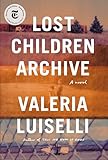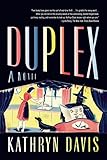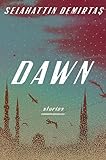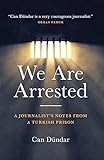I am vulnerable to the word once.
“‘Once long ago,’ Rogni said, ‘an old woman in a flowered housedress sat on a kitchen chair steeping tea in a cracked brown teapot. She was the Nurse-of-Becoming; she was getting ready to imagine two sisters. Only she made three mistakes.’” So begins Kathryn Davis’s Labrador. The curtain parts. The world disappears.
One of my favorite things to read this year has been Sabrina Orah Mark’s series Happily, on fairy tales and motherhood, online at The Paris Review. “My son’s first grade teacher pulls me aside to tell me she’s concerned about Noah and the Ghost People,” the first essay begins. The curtain parts. The world divides. The ghost people appear by my side.
 “In the house opposite, in the dark night of the garden, the governesses are playing cards. Eléonore who seems so straitlaced is laughing like a madwoman,” writes Anne Serre (and translator Mark Hutchinson), in The Governesses, another of my favorites. One that the New Directions catalog copy refers to as a “semi-deranged erotic fairy tale,” by the way. The curtains part. A light comes on the dark.
“In the house opposite, in the dark night of the garden, the governesses are playing cards. Eléonore who seems so straitlaced is laughing like a madwoman,” writes Anne Serre (and translator Mark Hutchinson), in The Governesses, another of my favorites. One that the New Directions catalog copy refers to as a “semi-deranged erotic fairy tale,” by the way. The curtains part. A light comes on the dark.
 “Mouths open to the sun, they sleep,” begins Valeria Luiselli’s novel Lost Children Archive, yet another favorite. The curtain parts. The dream begins. Current events become story.
“Mouths open to the sun, they sleep,” begins Valeria Luiselli’s novel Lost Children Archive, yet another favorite. The curtain parts. The dream begins. Current events become story.
Each year I tell my creative writing classes they must attempt to write literature, and literature does not let readers escape the world, it forces them to engage with the world. Your writing can be in any genre, I tell them, but its goal must be engagement, not escape. There are lots of enjoyable books that serve as an escape, I say. But that’s not what we’re writing.
I am not so sure anymore though.
Don’t I use literature as an escape?
Once I asked a student what he thought made a good book.
“A book that changes how you think?” he said.
“Then what makes a great book?” I asked.
“A book that changes how you act?” he said.
Do books ever change how I act?
I wonder.
I tell my students that writing should give the reader an experience.
That implies books could change how we act. Experiences change how we act. Don’t they? Shouldn’t they?
 In the spring, I was supposed to review Kathryn Davis’s novel The Silk Road. I volunteered to do it. I love the strange worlds of Kathryn Davis’s creations, and a novel that shifted between the Philadelphia suburbs of my mother’s ancestors and the silk road journeys of my father’s ancestors seemed custom-built for me. But I read it and I faltered. I didn’t understand it. I wasn’t sure if I liked it. So I read it again, and I liked it more, but understood it less. Possibly I became obsessed with it and the strange siblings that drift across its pages in some kind of maybe physical, maybe metaphysical journey after one of them has died. Possibly I read it three times. Still I couldn’t review it.
In the spring, I was supposed to review Kathryn Davis’s novel The Silk Road. I volunteered to do it. I love the strange worlds of Kathryn Davis’s creations, and a novel that shifted between the Philadelphia suburbs of my mother’s ancestors and the silk road journeys of my father’s ancestors seemed custom-built for me. But I read it and I faltered. I didn’t understand it. I wasn’t sure if I liked it. So I read it again, and I liked it more, but understood it less. Possibly I became obsessed with it and the strange siblings that drift across its pages in some kind of maybe physical, maybe metaphysical journey after one of them has died. Possibly I read it three times. Still I couldn’t review it.



 I suggested to the editor that I write an essay on Davis’s work as a whole instead. They agreed. So I reread Duplex, my favorite (schoolteacher dates sorcerer in suburban town studied by robots) and Hell, my second favorite (braided narrative of households across time and space, but much stranger than that makes it sound). I read Versailles (an often humorous Marie Antoinette retelling), The Walking Tour (two couples take a tour of Wales, not everybody comes home) and finally Labrador (awkward sister gets taken to Arctic by eccentric grandfather who is eaten by polar bear while graceful sister stays home and gets pregnant).
I suggested to the editor that I write an essay on Davis’s work as a whole instead. They agreed. So I reread Duplex, my favorite (schoolteacher dates sorcerer in suburban town studied by robots) and Hell, my second favorite (braided narrative of households across time and space, but much stranger than that makes it sound). I read Versailles (an often humorous Marie Antoinette retelling), The Walking Tour (two couples take a tour of Wales, not everybody comes home) and finally Labrador (awkward sister gets taken to Arctic by eccentric grandfather who is eaten by polar bear while graceful sister stays home and gets pregnant).
It was one of my favorite and strangest periods of reading. Dream upon dream. Not daydreams, which are carefully constructed fantasies, but night dreams, made up of recognizable parts assembled in peculiar configurations. I went into each novel and came back out again unable to recount exactly where I’d been. (The Silk Road aptly begins: “We were in the labyrinth.”) Maybe this doesn’t sound like a positive recommendation; but what I am trying to say is I lived inside of Kathryn Davis’s writing for awhile, and if you are the kind of person who wants to see the world with greater wonder, who is always looking for foreign lands in the backs of wardrobes, who understands death to be close all of the time but also probably not within the realm of imagining—these books are for you. They are an escape, though one from which you return with a greater capacity for seeing and appreciating the wondrous world.
But still I didn’t write the essay.
Maybe this had less to do with the difficulties of writing and more to do with the difficulties of life.
My father died this year. Now I have another father, of memory and story and imagination, an autofictional father existing in another dimension. Now I tell stories about him that he will never hear. On his death certificate, the funeral home listed him as female. They also handed his box of remains to my mother inside of a sparkly green gift bag. Upon receiving this gift, my mother and I did not react, nor look at each other, until we stepped outside of the building and burst into laughter. “It’s okay, I’ll reuse it,” my mother said. We laughed even harder. But my father, who appreciated jokes, perhaps would not have appreciated this one.
“Will you weep when I die?” he used to ask me, as if there was any doubt.
Once once once. I had a father.
Escape engage. Escape engage. The story of mourning.
In Turkish there is a storytelling tense, not past, not present, not future. The tense for repeating things you heard secondhand but did not have direct experience of. The once-upon-a-time tense. In that tense I still have a father.
When my father died he had both Alzheimer’s and a rare form of mouth cancer. Because of the Alzheimer’s he sometimes forgot he had cancer. My mother would have to tell him again. And again.
If she could have, my mother would have let him forget. But my father would moan, or scream, or really scream, that his mouth hurt, why wasn’t she taking him to the dentist, why wasn’t she helping him. Even after weeks of chemo, he could still forget.
Wouldn’t it be nice if forgetting was an escape? But all it did was make his pain inexplicable.




 Because I am both Turkish and not, every year I read as many Turkish writers as I can. This year I had much appreciation for: Ayşegül Savaş’s lyric novel Walking on the Ceiling; jailed politician Selahattin Demirtaş’s sometimes charming, sometimes brutal story collection Dawn; Ece Temelkuran’s dire but believable warning that engagement without activism becomes the mere “expression and exchange of emotional responses” How to Lose a Country: The 7 Steps from Democracy to Dictatorship; Can Dündar’s surprisingly humorous and even joyful We Are Arrested: A Journalist’s Notes From a Turkish Prison; and journalist Ahmet Altan’s more somber I Will Never See the World Again (translated by Yasemin Congar), also written in jail and smuggled out via his lawyers.
Because I am both Turkish and not, every year I read as many Turkish writers as I can. This year I had much appreciation for: Ayşegül Savaş’s lyric novel Walking on the Ceiling; jailed politician Selahattin Demirtaş’s sometimes charming, sometimes brutal story collection Dawn; Ece Temelkuran’s dire but believable warning that engagement without activism becomes the mere “expression and exchange of emotional responses” How to Lose a Country: The 7 Steps from Democracy to Dictatorship; Can Dündar’s surprisingly humorous and even joyful We Are Arrested: A Journalist’s Notes From a Turkish Prison; and journalist Ahmet Altan’s more somber I Will Never See the World Again (translated by Yasemin Congar), also written in jail and smuggled out via his lawyers.

 But the book that stopped me in my tracks was More by Hakan Günday (translated by Zeynep Beler). You can’t find a summary or review of the novel that doesn’t include words like harrowing, disturbing, and unsettling. The narrator is a teenager engaged in the family business—smuggling refugees for money with zero concern for the refugees’ safety or survival. It is no surprise that this novel has not had the popularity of its much sunnier bookend, Mohsin Hamid’s Exit West. Where Hamid uses fantasy to create hope, Günday uses it to create horror. The title comes from the refugees’ cries for “more” food as the narrator scrapes excrement off the floor of the concrete bunker they are buried in during the smuggling process. The novel, which to be clear, I admired tremendously, reads very much like a nightmare—appropriately so given the real life circumstances it is trying to place the reader inside of. But even it, was also, for me, an escape. What have I done for the Syrian refugees other than imagine their nightmare? Doesn’t educating myself about the horrors of the world make me feel proud! But what does it do for those who suffer them?
But the book that stopped me in my tracks was More by Hakan Günday (translated by Zeynep Beler). You can’t find a summary or review of the novel that doesn’t include words like harrowing, disturbing, and unsettling. The narrator is a teenager engaged in the family business—smuggling refugees for money with zero concern for the refugees’ safety or survival. It is no surprise that this novel has not had the popularity of its much sunnier bookend, Mohsin Hamid’s Exit West. Where Hamid uses fantasy to create hope, Günday uses it to create horror. The title comes from the refugees’ cries for “more” food as the narrator scrapes excrement off the floor of the concrete bunker they are buried in during the smuggling process. The novel, which to be clear, I admired tremendously, reads very much like a nightmare—appropriately so given the real life circumstances it is trying to place the reader inside of. But even it, was also, for me, an escape. What have I done for the Syrian refugees other than imagine their nightmare? Doesn’t educating myself about the horrors of the world make me feel proud! But what does it do for those who suffer them?
I guess I believe reading generates empathy. I feel pretty sure it can offer readers life experiences they would not otherwise have. But does it change how we act?
Engage escape engage escape.
When I read Ahmet Altan, I am outraged at his imprisonment. When I read the news of his release, I feel joy. When I read the news of his re-arrest, I feel outrage again. But feelings aren’t engagement, are they?
Are they?
For me, the action that reading triggers is writing. And here is my bigger fear: that writing isn’t engagement either.
I don’t doubt the value of literature, of representation, of the framing of narratives, of making our pain explicable, but writing isn’t enough. How could it be? And yet, at times, I have treated it as if it is. Even now, even now as I type this and imagine you reading it, I am hoping that you, not I, will be moved to act, to right the world, right…now.
More from A Year in Reading 2019
Don’t miss: A Year in Reading 2018, 2017, 2016, 2015, 2014, 2013, 2012, 2011, 2010, 2009, 2008, 2007, 2006, 2005









